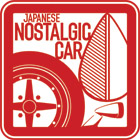What is Japanese Nostalgic Car?
A publication for collectors, enthusiasts and drivers of vintage Japanese automobiles. Our goal is to elevate awareness of old Japanese cars, educate people about Japanese car history, attract more individuals to the hobby and perhaps even save a few cars from being scrapped.
How is JNC different from other Japanese classic car magazines?
As far as we know, it’s the first and only publication in the United States devoted solely to the subject. Beyond that, we strive to bring you the absolute best and most accurate journalism possible. Documentation from the era is notoriously ill kept, not to mention that lot of what passes for information out there is just plain wrong. We conduct extensive research to debunk myths and rectify mistakes that, in some cases, have been circulating for so long they’ve become “fact.”
Why do you use the word “nostalgic” rather than “classic” or “vintage” or others?
In Japan, the word “nostalgic” is applied to items of various age that evoke the feel of eras past, from Astro Boy manga to wind-up tin toys.
To a lesser extent, in official Concours d’Elegance circles such as the Classic Car Club of America, the word “classic car” has a very strict definition that includes only cars built during a certain period of time and only cars that originate from Europe or America. Furthermore, some take the exclusivity of limited original production numbers into consideration. We still use the words “classic” and “vintage” but felt that the title should pay homage to Japanese tradition.
Why did you start JNC?
We’re die-hard aficionados of all things automotive, from chrome-laden Detroit classics to carbon-fibered compacts, but in the vast culture of cars it seemed that Japanese autos of the old school variety were often overlooked. After a lifetime poring over old brochures, magazine articles and poorly translated Japanese, we realized what we wanted and needed was a long-overdue venue to see, discuss and share the cars we love with others. We mention this because we want you to know that the effort spent on JNC is truly a labor of love.
Why are old school Japanese cars often overlooked?
Vintage Japanese cars have always had a small (and growing) following, but they are mostly neglected by mainstream collectors. There are many reasons, but the main ones are a perceived lack of heritage and/or prestige and timing.
Traditionally, the most valuable and collectible cars have come from Europe, where they started as custom-built coaches for the very wealthy. In the US Japanese cars are relative newcomers, having mostly arrived in the 1960s. Because it usually takes a car at least 20-25 years to become somewhat rare, the idea of a Japanese classic car simply has not been in the American consciousness for that long.
So will Japanese cars ever be worth anything?
Most collectors are not aware of nostalgics or see them as only appliances that get you from A to B. Many have stated bluntly that Japanese cars can never achieve classic or collectible status.
Nevertheless, there was once a time when cars like a tri-five (1955-57) Chevy were also considered just an appliance, a working man’s stepping stone to a Pontiac. Nowadays they can fetch over six figures. The same holds true for 60s and 70s muscle cars and the lesser counterparts on which they were based, with some particularly rare models selling in the millions.
In the past decade or so post-war American cars from the 1950s to early 1970s, which like Japanese cars started life as simple people-movers, have seen their value and appeal skyrocket. This showed that unlike in the traditional collectible car market, a model didn’t have to be prestigious to be sought after. Simple nostalgia can be just as important as, if not more than, prestige. Besides, the goal of vintage car ownership isn’t always about money.
What kind of cars does JNC cover?
There are only 2 criteria. The cars have to be Japanese and 25 years or older. However, we welcome enthusiasts of cars of any age to the JNC Forum.
Why 25 years?
Rules vary from state to state but most will give a car 25 years or older historic status, allowing them reduced registration costs and certain exemptions from inspection. In addition, most companies specializing in insuring collector cars also cite 25 years as the cutoff age. 25 is also the age at which a car becomes eligible for import into the United States, according to the federal government (however, vehicle registration is a state-level issue and varies from state to state. Check your local rules).
How much is my car worth?
Unless you have one of a few select models, Japanese cars have traditionally not been on the radar for collectors. Most price guides tend to undervalue what you could get from a true enthusiast, but finding that enthusiast buyer will require much patience. As the hobby grows such figures will be more readily available. For now, try listing it in the swap meet section of the JNC Forum.
Where can I find a particular car?
The classifieds section of our forum or used car sites such as eBay Motors or craigslist are a good place to start. There are sites and companies devoted to certain models or specializing in finding cars, but keep in mind that they can be quite costly. Unfortunately, either you do the work yourself or pay someone to do it.
One major problem is that many people who own nostalgics don’t see them as having value and end up sending them to the crusher. One of our goals is to educate people in an attempt to stem the losses.
What cars should I be collecting?
Cars that you like. If you have to ask what you should like, you shouldn’t be collecting. 😉
How do I get my car featured on your site?
Please contact our Profile Submission Department.
Will my current car be valuable in the future?
Unfortunately there’s no concrete way to predict if you’re sitting on a rolling gold mine. But take a look at the hottest tickets in the vintage scene in recent years – post-war American cars that hailed from the Golden Age of the US auto industry.
The main cause is that the generation who grew up with such vehicles is now nearing an age where their kids have left the nest, their mortgages are paid for and they have disposable income. More importantly, they’ve developed feelings of nostalgia for the cars they once owned or aspired to own. With an ever-increasing number of Americans having grown up with Japanese cars, the question is will they reminisce about the vehicles of their youth? We think the answer is “yes.”





